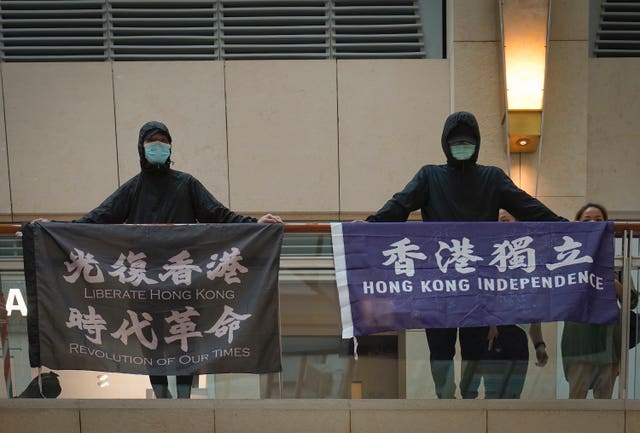
Criticising laws or chanting anti-government slogans can be enough to jail someone for sedition in Hong Kong, an appeal court has ruled in a landmark case brought under a colonial-era law increasingly used to crush dissent.
Hong Kong’s Court of Appeal upheld a 40-month sentence for pro-democracy activist Tam Tak-chi, the first person to be tried under the city’s sedition law since Hong Kong returned to Chinese rule in 1997.
Tam’s lawyers had argued his conviction should be overturned because the prosecution did not show he meant to incite violence.
The prosecution is widely seen as part of Beijing’s clampdown on dissent in the former British colony, following widespread anti-government protests in 2019.
Tam was convicted on 11 charges in 2022, including seven counts of “uttering seditious words”.
A judge at the lower court took issue with him chanting the popular protest slogan “Liberate Hong Kong, revolution of our times” — words the government says imply separatism — and criticising the Beijing-imposed National Security Law during a primary campaign.
The judge said his words broke the law because they incited discontent against Hong Kong and disobedience to the law.
Tam and his lawyers had drawn hope from a ruling made by a top Commonwealth court in a 2023 case about a similar law. In that case, the London-based Privy Council said that the sedition law in Trinidad and Tobago could not be used to convict people unless they intended to incite violence or disorder. The Privy Council is the court of final appeal for a number of Commonwealth countries.
But the Hong Kong court rejected the argument, finding that the Privy Council ruling only applied to the law in Trinidad and Tobago.

Judge Jeremy Poon said sedition in Hong Kong was a statutory offence, not a common law offence. He added that the law’s legislative history made it clear that an intention to incite violence was not a necessary element of most sedition offences.
“Nothing suggests that any individual, including the applicant, a politician and activist highly critical of the government and a stern opponent of government policy, would be subject to an unacceptably harsh burden because of the restriction on seditious acts or speeches imposed by the offence,” the ruling said.
To effectively respond to seditious acts endangering national security, seditious intent had to be “broadly framed to encompass a myriad of situations” that may arise at different times, they said.
Their ruling is expected to guide other sedition cases in the city, including a looming verdict for two former editors at the now-closed pro-democracy news outlet Stand News.
The media company shut down in 2021 after senior managers were arrested for sedition and police conducted a high-profile raid on its office.
Hong Kong has seen its freedoms decline in recent years as Beijing has tightened control over the city.
The sweeping National Security Law, together with the sedition law, has been used to arrest pro-democracy activists and dissidents.
The Hong Kong government has hailed Beijing’s National Security Law for bringing back stability to the city.
The city’s administration is planning its own version of the law, targeting offences such as theft of state secrets and espionage, and to sharpen other existing laws.
In proposals unveiled in January, authorities said they were planning to increase penalties for “seditious intention”.
Currently, first-time offenders face up to two years’ imprisonment.

Enjoy the convenience of having The Sunday Post delivered as a digital ePaper straight to your smartphone, tablet or computer.
Subscribe for only £5.49 a month and enjoy all the benefits of the printed paper as a digital replica.
Subscribe